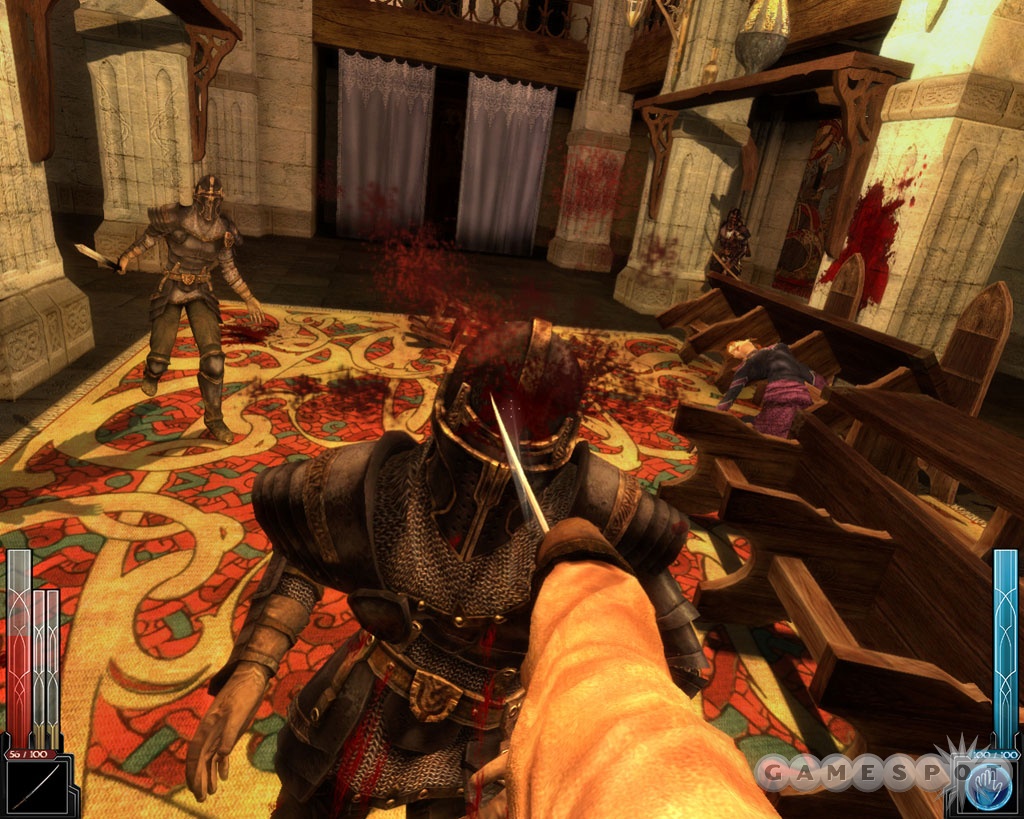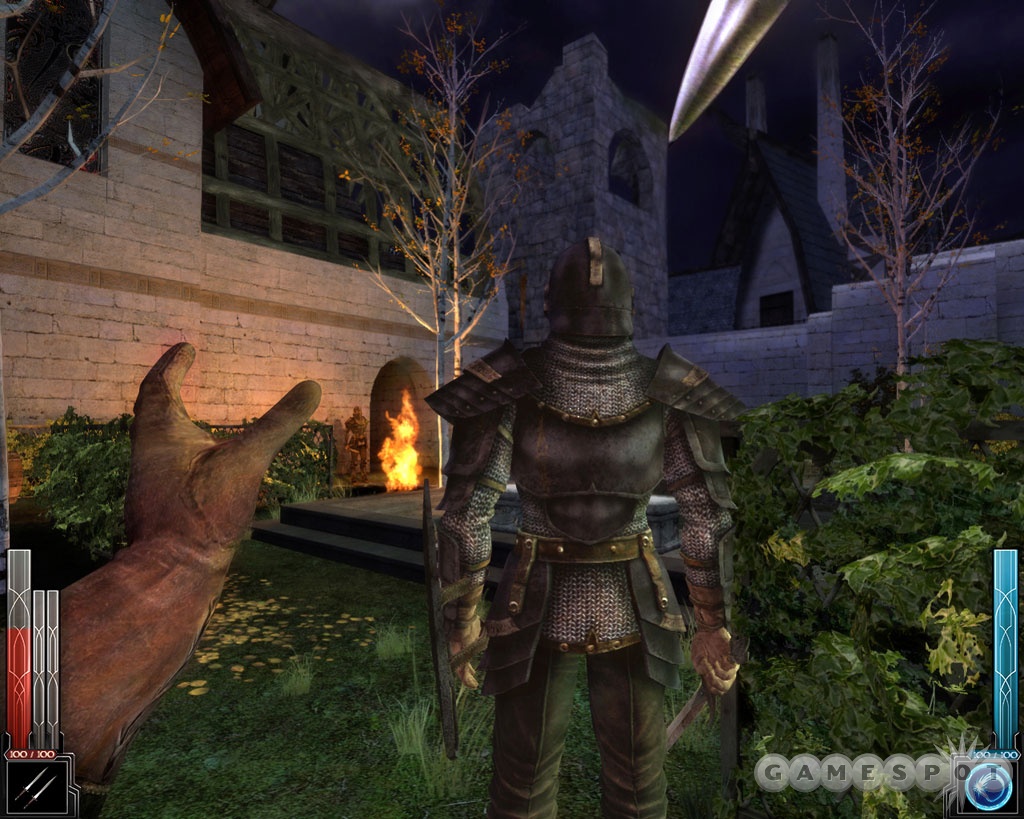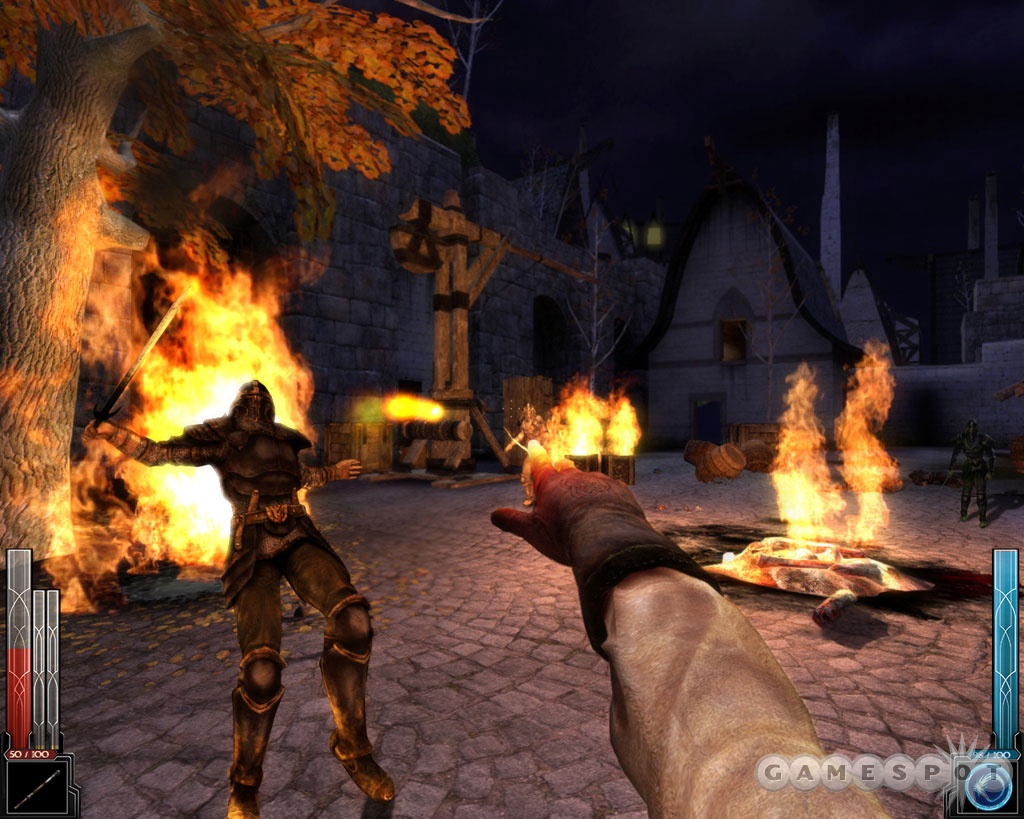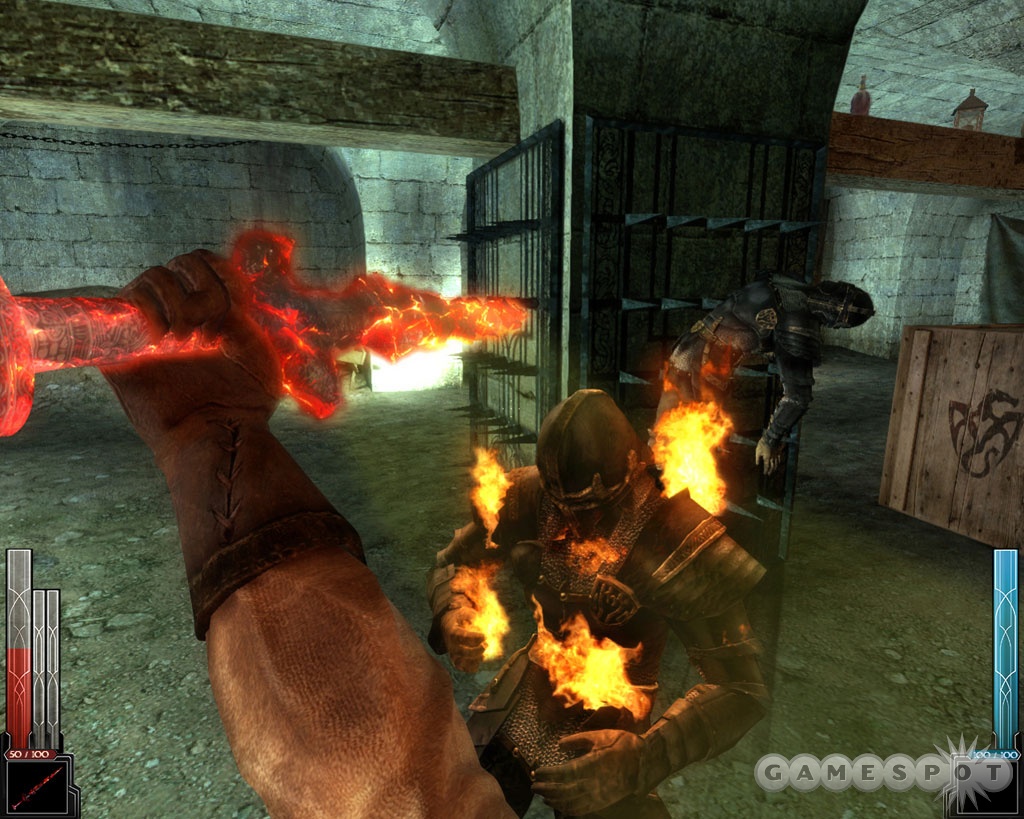Dark Messiah of Might and Magic Exclusive Single-Player Hands-On
We went to Lyon, France, to get some of the very first hands-on time with the single-player game of Dark Messiah of Might and Magic.
We've seen plenty of first-person shooters, but first-person swordfighting, backstabbing, and orc-kicking games are another matter entirely. That's where Dark Messiah of Might and Magic comes in. Dark Messiah is going to be the latest game in the Might and Magic franchise, one of the oldest in all of gaming, but it also represents an exciting new direction for the series. This action game with role-playing elements is built on the Source engine, the same one used to power Half-Life 2, and like that game, Dark Messiah promises to blend cutting-edge technology with razor-sharp gameplay. To learn more, we visited the developer, Arkane Studios, in Lyon, France, to get some of the very first hands-on time with the single-player component of Dark Messiah.
Let's cut through some of the confusion surrounding the game first. Dark Messiah isn't a traditional role-playing game, but rather it's a mission-based action game with heavy role-playing elements. In other words, you won't be roaming around collecting herbs to make potions, or anything like that. Instead, you'll work your way through the levels of Dark Messiah much like you would in any other action game. What makes Dark Messiah so promising, though, is the sheer open-ended nature of the gameplay. You can get through the game any number of ways. Aggressive players can cut their way through dozens and dozens of foes, while more-cunning players can stick to the shadows and eliminate foes quietly.

At Arkane, we were able to play through the tutorial, as well as some of the opening levels, which are quite different from the levels seen in the recently released single-player demo. You play as Sareth, a protégé of the wizard Phenrig, and in the tutorial you must recover a special crystal that plays a role throughout the game. In the opening levels, you must deliver that crystal to authorities in the human town of Stonehelm, but that's a task that's easier said than done, thanks to the small army of enemies that you encounter along the way.
There are no traditional character classes in Dark Messiah, as Sareth is a mix of fighter, thief, archer, and wizard. He's a jack-of-all-trades that can do it all, though to what extent he can do those things will be up to you. There is a skill tree that will let you customize Sareth to fit your playing style. For example, if you want to be a fighter, then dump the points that you earn through the game into melee combat. If you want to be more of a magic user, you can unlock more-powerful spells. The skill tree is large enough that you won't be able to unlock everything in a single game, which means that you can play the game over again and experiment with different skills and abilities.
There are four classes of weapons in Dark Messiah: swords, daggers, bows, and staves. Each class has approximately seven weapons in it, so you're looking at a total arsenal of about 30 weapons. Naturally, you'll start out with basic weapons, but you'll earn more-powerful ones as you progress, so you can start out with a regular sword but work your way up to larger, stronger versions, such as the sword of fire (guess what it does). Swords are the preferred weapon for a straight-up fight, while daggers are better for sneaking up on someone. The staff isn't quite as powerful as the sword, but it has a longer reach and is ideal for battling multiple opponents simultaneously. Then there's the bow, which is the primary ranged weapon. For protection, there's armor, which comes in various forms. Fighters will steer toward heavier armor, such as chain mail, while thieves and assassins will prefer lighter armor. Meanwhile, wizard robes will help spellcasters.
There is no weight restrictions in Dark Messiah, so you don't have to worry about juggling items, nor do you have to worry about rearranging gear in the inventory to maximize space. The inventory system is simply slot-based, and as long as you have an empty slot, you can put a single item into it, no matter how large or how heavy that item is. That's good news, because you can pick up a lot of gear during your adventures, ranging from weapons from fallen enemies to potions and even food, which can restore lost hit points.
Once you're all geared up, it's time to fight. Combat isn't just a matter of mashing down mindlessly on the mouse button. Rather, it requires more thought, especially in a sword duel. Simply tapping the mouse button in a swordfight will result in a lot of ineffective jabs against an armored opponent. What you need to do is hold the mouse button down and move the mouse in any direction to ready a power strike. There's a different power strike mapped to each of the cardinal directions, so you have some tactical choices when you attack. For instance, moving the mouse to the right will ready a two-handed side strike, while moving the mouse up will ready a downward strike. Meanwhile, holding down the right mouse button will ready your sword to parry an incoming attack. If you get into a duel against a good opponent (and we had our hands full with many of them in the game), you're going to experience the closest that we've seen to real swordfighting in a game to date.

This feeling of being in a desperate fight to the death is enhanced by other moves at your disposal. You can kick at opponents, which may knock them off balance long enough for you to give them a good swipe to the midsection. Or, if you're battling near a cliff, a kick could send them hurtling over the side. Or, if you're near a raging bonfire, a kick could send them through the flames to a burning death. Or, if there's a bed of spikes along the wall, a kick could impale your opponent on the spikes. You get the idea. If an opponent is knocked to the ground, you can execute a finishing move to plant your sword in his chest before he can get up again. Or, you can potentially disarm an opponent by knocking his weapon out of his hands and sending it flying through the air (at which point, your opponent may try to pummel you with his fists, chase his fallen weapon, or grab any weapon that is nearby).
Everybody was Swordfighting
Of course, it's so easy to get caught up in swordfighting that you might overlook the many other ways you can battle opponents in the game. Those seeking to be a bit stealthier can play as assassins. You can go around armed with dual daggers and sneak up behind opponents to plant those daggers into their backs (you can also hurl daggers into the back of fleeing enemies). Or, if you need to kill someone from a distance, you should ready a bow and take careful aim, because the game's physics engine means that arrows will arc in flight. Those who are magically inclined will steer toward the arsenal of 12 spells, many of which have all sorts of versatile uses. These include dark vision, heal, lightning, charm, freeze, flame arrow, and more. Lightning, for example, can be used to stun a foe directly, or you might direct it toward the pool of water that a foe is standing in. 
All of these combat options are enhanced by fatality moves. As you fight opponents, you'll build up adrenaline in a special meter. When the meter is full, you'll be able to execute a fatality attack, which is a bigger version of an existing attack. So if you're swordfighting, a fatality attack may mean the difference between a normal swipe of the sword and literally separating someone's head from the rest of his body (you can also take off limbs). Another type of fatality-fueled sword attack could have you plant your blade through a foe's body, and then kick the body off. If you're using the staff as a weapon, you'll spin the opponent around, use the staff to choke him from behind, and then break his neck. If you're using magic, you'll find fatality will enhance the effect spells. For example, the weaken spell will shrink an opponent (you can then punt the puny opponent across the screen), or the flame arrow will suddenly turn into a giant fireball. Fatality moves are visually cinematic, appropriately gory, and very cool.
There's so much sheer variety to the combat that each encounter feels different and challenging. In some ways, the combat reminds us a bit of Halo, as we got the feeling that you could fight the same battle multiple times and watch it unfold in wildly different ways. And the Halo comparison will be inevitable once you take into account Xana, a magical spirit that possesses Sareth's body and goes along for the ride. She's sort of like Cortana to Halo's Master Chief, as she provides internal commentary along the way, though Xana is far more caustic and possessive than Cortana ever was.
The environments that we encountered were incredibly well realized thanks to the Source engine. The Arkane team has modified the engine quite a bit to fit its needs, and the results are impressive. The game uses high dynamic range lighting, and that helps create plenty of realistic shadows to skulk around in, should you choose to do so. The streets and alleyways of Stonehelm are narrow, and you'll have plenty of opportunity to take to the rooftops and ledges to do some sneaking around. When doing so, a stealth meter appears onscreen to tell you your level of visibility, so you can use it to help get around patrolling guards. If you need to take out a guard, you should do it quietly, so that you still maintain stealth. Bodies can be dragged to dark corners to stay hidden from patrols, or, if you want, you can move a body to a more-visible area and use it as bait to draw the attention of other guards.
We're impressed by the sheer intelligence at work in the opponents of this game. The enemies we battled were smart and aware of everything around them, and they summoned help when needed, or barked instructions to one another when in a group. In a fight, enemies could skillfully dodge and parry our attacks, making each fight a challenge. We battled a variety of foes. By far the most numerous were the orcs, though we did encounter ghouls, goblins, and human opponents, as well. If you come across a necromancer, a good piece of advice is to kill him first, as necromancers may summon ghouls to battle. Or, even worse, the necromancer will reanimate the corpses of opponents that you've killed, which means that you have to deal with them all over again. The good news is that if you can take out the necromancer, then you effectively get rid of all the creatures that he controlled, because they will collapse without their master animating them.

As you can probably tell, the environment plays a critical role in Dark Messiah. And when you add the physics and the artificial intelligence, you have a lot of ways you can use the environment to your advantage. Pick up a clay pot and toss it in a dark corner to create a distraction or to draw the attention of any patrolling guards. Or, if you're desperate, pick up an object and hurl it at an attacking enemy to knock him off balance. You can cause heavy objects to fall to the ground and they will crush anyone beneath them, or kick objects at your opponents to slow them down. There are all sorts of environmental traps and dangers around the world that we saw, so you'll have no shortage of creative ways to dispatch enemies. Of course, the danger is not to fall victim to them, yourself.
We came away from the gameplay session very impressed with the dynamic nature of the combat. Dark Messiah offers an incredibly visceral experience rarely seen on the PC, and the sheer depth of the combat will likely have you coming back for more. And this is only half of the game, as publisher Ubisoft has a second development studio working on the multiplayer component of Dark Messiah. That's something that we'll cover later on, but for now, we can safely say that the single-player of Dark Messiah looks very good indeed. The game is nearing the end of development, and we can expect it to ship in October.
Got a news tip or want to contact us directly? Email news@gamespot.com
Join the conversation